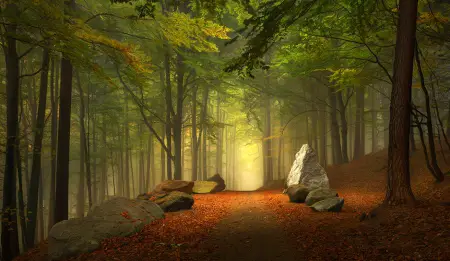By Julian Websdale
Guest Writer for Wake Up World
“If the doors of perception were cleansed, everything would appear to man as it is, infinite. For man has closed himself up, ’til he sees all things through the narrow chinks of his cavern” ~ William Blake.
Mysticism is the union of art with Reality. The mystic is a person who has attained that union in greater or less degree; or who aims at and believes in such attainment. The real mystical life, which is the truly practical life, begins at the beginning – not with supernatural acts and ecstatic apprehensions, but with the normal faculties of the normal man or woman.
The visionary is a mystic when his vision mediates to him an actuality beyond the reach of the senses. The philosopher is a mystic when he passes beyond thought to the pure apprehension of truth. The active man is a mystic when he knows his actions to be part of a greater activity.
[pro_ad_display_adzone id=”110028″]
Recollection is in essence no more and no less than subjecting the attention to the control of the will. Recollection begins in the deliberate and regular practice of meditation; a perfectly natural form of mental exercise, though at first a hard one. Meditation is a half-way house between thinking and contemplating: and as a discipline, it derives its chief value from this transitional character.
As your meditation becomes deeper it will defend you from the perpetual assaults of the outer world. You will hear the busy hum of that world as a distant exterior melody, and know yourself to be in some sort withdrawn from it. You have set a ring of silence between you and it; and within that silence you are free.
The artist, the discoverer, the philosopher – the true enthusiast for any form of life – can only achieve the full reality to which his special art or passion gives access, by innumerable renunciations. He must kill out the smaller centres of interest, in order that his whole will, love and attention may pour itself out towards, seize upon, unite with, that special manifestation of the beauty and significance of the universe to which he is drawn.
The more deeply and completely you become immersed in and aware of this life, the greater the extension of your consciousness; the more insistently will rumours and intimations of a higher plane of experience, a closer unity and more complete synthesis, begin to besiege you. All that will now come to you – and much perhaps will come – will happen as it seems without effort on your own part. Though really it will be the direct result of that long stress and discipline which has gone before, and has made it possible for you to feel the subtle contact of deeper realities.
To use St. Teresa’s well-known image, you have been watering the garden of your spirit by hand; a poor and laborious method, yet one in which there is a definite relation between effort and result. But now the watering can is taken from you, and you must depend on the rain: more generous, more fruitful, than anything which your own efforts could manage, but, in its incalculable visitations, utterly beyond your control.
Here all one can say is this: that if you acquiesce in the heroic demands the spiritual life now makes upon you, if you let yourself go, eradicate the last traces of self-interest even of the most spiritual kind – then you have established conditions under which the forces of the spiritual world can work on you – heightening your susceptibilities, deepening and purifying your attention, so that you are able to taste and feel more and more of the inexhaustible riches of Reality.
When the greater love overwhelms the lesser, and your small self-conscious is lost in the consciousness of the Whole, it will be felt as an intense stillness, a quiet fruition of Reality. You are now released from the crowd’s overwhelming consciousness as you never were before. You feel yourself now a separate vivid entity, a real, whole person: dependent on the Whole, and gladly so dependent, yet within that Whole a free self-governing thing.
Reference:
Underhill, E. (2010). Practical Mysticism. [e-book] Digireads.com.
Previous articles by Julian:
- Pyramid Power: Harnessing the Energetic Fields of Pyramids
- How to Induce Lucid Dreaming
- Expanding Our Awareness
- Sacred Sites and Energy Fields
About the author:
Julian Websdale is an independent researcher in the fields of esoterica, metaphysics, and mysticism. His interest in these subjects began in 1988, at the age of seven. Julian was born in England and received his education as an engineer from the University of Bolton. Julian served in a Vaishnava monastery, and has traveled to over 14 countries since 2012. His work creates enthusiastic responses from inquiring minds across the world.
Follow Julian on Facebook and Twitter, or visit his blog.
[pro_ad_display_adzone id=”110027″]







